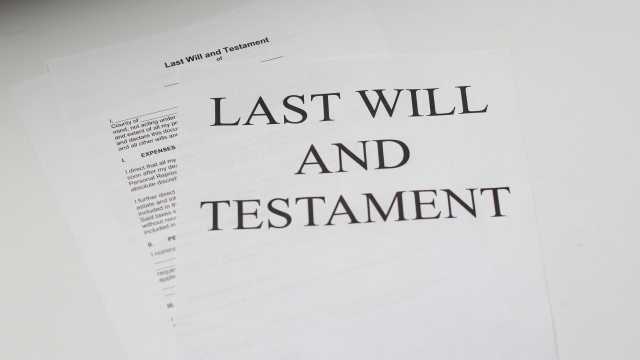Estate Planning
What is a trust? It’s an estate planning tool designed to hold your assets for later distribution. Understanding how trusts work can help you make sure everything’s in order. We'll walk you through how they work in this article.

Stephanie Faris
•
Published March 14th, 2022
Table of Contents
Key Takeaways
A trust, which is sometimes called a trust fund, lets you set assets aside for loved ones, charities, and other beneficiaries.
You can set up a trust on your own or enlist the help of an estate attorney.
To legalize your trust, you’ll need notarized documentation and a trustee.
As you get older, thoughts naturally turn to taking care of your loved ones after you’re gone. Whether it’s a spouse, children, a parent, or someone else in your life, you can’t just rely on your assets to automatically go to the people you want.
That’s where a trust can come in. What is a trust? It’s an estate planning tool designed to hold your assets for later distribution. Understanding how trusts work can help you make sure everything’s in order.
What is a Trust Fund?
When it comes to estate planning, two planning tools come into play: wills and trusts. A will puts your wishes in writing, to be carried out by your executor and approved by the courts. A trust, on the other hand, is a legal entity that puts your assets in holding until a later date.
Typically, a trust fund is a revocable living trust, which simply means you create it while you’re alive. As such, you can revoke the trust at any time before your death. When you create a trust, you decide when the funds are to be distributed, whether it’s after you die, when beneficiaries reach a certain age, or on a predetermined date in the future.
Why Set Up A Trust Fund?
There are various reasons to set up a living trust. One of the biggest is that, unlike a will, a trust doesn’t go through probate. This can give you a vehicle for transferring funds to your survivors without worrying about the courts intervening.
Trusts can also be used to protect beneficiaries against overspending. Often trust funds are set up for minors, for instance, with the stipulation that they’ll receive the funds when they reach a certain age. This ensures if you die when your children are young, they’ll have money set aside for them once they reach adulthood.
How To Set Up A Trust
Once you understand what is a living trust, you might want to know how to go about starting one. While you don’t need an attorney to set up a trust, legal professionals have the expertise to ensure everything is done correctly. Search for an estate planning attorney near me and see if you find an affordable option.
Whether you use an attorney or not, here are a few basic steps you’ll need to take in setting up your trust fund.
1. Decide on how you’ll set up the trust
The first important step on your road to setting up a trust is a quick inventory of your assets. This is something you will do on your own even if you’re working with a lawyer. This planning step is one area where there isn’t a difference between a trust vs will. Planning is an important part of either process.
Before you put a trust in place, consider the purpose of it. For instance, if your goal is to fund your infant’s college education, you’ll set things up differently than if you want to make sure some of your money goes to your favorite charity after you die.
2. Create a trust document
Another similarity between a living trust vs will is that you’ll need paperwork to make it legal. You can find DIY trust services, but an attorney is best if you want to make sure everything is legally sound. A quick Internet search for “trust attorney near me” will help you locate some good ones nearby. You can also ask your financial advisor and friends for recommendations.
Depending on the type of trust you’re setting up, an attorney will recommend a declaration of trust, deed of trust, or trust instrument to formalize your trust fund. In some states, you can register your trust document with the state, but at the very least, you should make sure it’s stored in a safe, accessible place.
3. Notarize the agreement
Any will or trust you create needs to be signed according to local laws. A trust attorney can help with this, but if you’re handling things on your own, you’ll need to look into regulations regarding trusts.
In many states, trusts don’t require a signature in front of multiple witnesses, but some do. You do, however, need to take your trust to a notary and sign it. If you’re creating a trust in conjunction with your spouse or someone else, both of you will need to visit the notary together.
4. Set up a trust bank account
Whether you use a trust and will attorney or do things yourself, you can handle this step on your own. Your current bank probably offers trust accounts, and having it there could keep things simple. But even if your bank offers it, it’s always best to look into fees and balance requirements and compare them to what other lenders offer.
While setting up a trust can help you avoid the fees and delays you’ll get with probate of will, it’s still important to make sure you have the right person in charge. You’ll need to designate a trustee who will make sure the funds are distributed according to your wishes. A trustee can be a dependable friend, a family member who isn’t among the beneficiaries, or an attorney. Basically, a trustee can be anyone you will trust to manage things.
5. Transfer assets into the trust
Once you’ve set up a trust account, you have to get your assets into it. Even if your funds are at the same bank, it’s not as simple as moving money from one account to another. Your lender will likely require you to complete a form and provide a certificate of trust, which is a legal document that solidifies your trust as a legal entity.
Money isn’t the only thing you can move into your trust, though. Anything you want to grant to someone without going through probate will probably go into your trust, but obviously you can’t deposit a house into a bank account. For these tangible assets, you’ll need to attach a property schedule to your trust document.
6. Where necessary, name the trust as a beneficiary
Laws can vary on how trusts are handled. This is where finding trust lawyers near me can come in handy. But in some cases, you may need to name your trust as a beneficiary. If you’re leaving a retirement account to your trust, for example, you’ll need to update the documentation attached to that account.
Another difference between a will and a trust is that things can get tricky when it comes to redirecting your assets. You might be limited as to who can update your beneficiaries, so it’s important to do this before your death to avoid your estate executor running into issues.
Final Thoughts
A trust ensures your assets are handled exactly as you want them to be, whether before or after your death. A certified financial planner can help you update your beneficiaries and track down all your assets to make sure everything is accounted for in both your will and any trusts you set up.
Share this advice

Stephanie Faris has written about finance for entrepreneurs and marketing firms since 2013. She spent nearly a year as a writer for a credit card processing service and has written about finance for numerous marketing firms and entrepreneurs. Her work has appeared on Money Under 30, The Motley Fool, MoneyGeek, E-commerce Insiders, and GoBankingRates.
Intro to Estate Planning
Wills
Trusts
Divorce Considerations For Retirement
Estate Settlement
Share this advice

Stephanie Faris has written about finance for entrepreneurs and marketing firms since 2013. She spent nearly a year as a writer for a credit card processing service and has written about finance for numerous marketing firms and entrepreneurs. Her work has appeared on Money Under 30, The Motley Fool, MoneyGeek, E-commerce Insiders, and GoBankingRates.
Free Retirement Consultation
Still have questions about how to properly plan for retirement? Speak with a licensed fiduciary for free.



